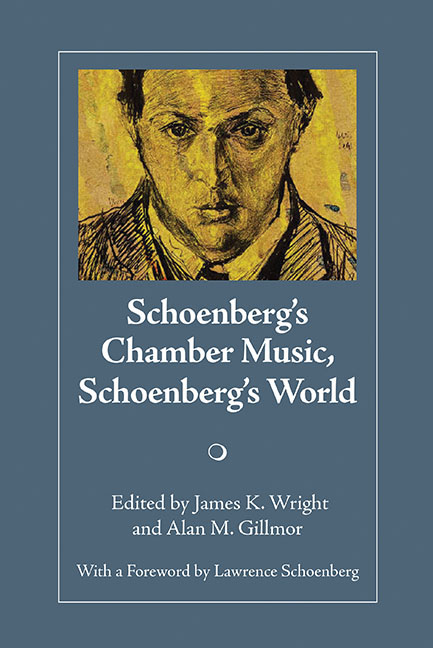Book contents
- Frontmatter
- Contents
- Foreword
- Preface
- HISTORICAL PERSPECTIVES
- ANALYTICAL PERSPECTIVES
- OTTAWA SYMPOSIUM AND CHAMBER MUSIC FESTIVAL PHOTOS
- PERFORMANCE, RECEPTION, AND INTERNATIONAL INFLUENCE
- Echoes of Pierrot Lunaire in American Music
- Expressivity, Color, and Articulation in Schoenberg's Seventeen Piano Fragments
- Critical Reception, Performance, and Impact of Schoenberg's Music and Thought in Canada Prior to 1960
Critical Reception, Performance, and Impact of Schoenberg's Music and Thought in Canada Prior to 1960
from PERFORMANCE, RECEPTION, AND INTERNATIONAL INFLUENCE
- Frontmatter
- Contents
- Foreword
- Preface
- HISTORICAL PERSPECTIVES
- ANALYTICAL PERSPECTIVES
- OTTAWA SYMPOSIUM AND CHAMBER MUSIC FESTIVAL PHOTOS
- PERFORMANCE, RECEPTION, AND INTERNATIONAL INFLUENCE
- Echoes of Pierrot Lunaire in American Music
- Expressivity, Color, and Articulation in Schoenberg's Seventeen Piano Fragments
- Critical Reception, Performance, and Impact of Schoenberg's Music and Thought in Canada Prior to 1960
Summary
In August 1960 the International Conference of Composers took place in Stratford, Ontario. Fifty-five composers, representing twenty countries (including twenty-eight composers from Canada), were in attendance at the event. At the time, international music critics expressed astonishment at the range of compositional approaches that were employed by Canadian composers, and wondered why they lacked previous awareness of Canadian chamber and orchestral music, some of it composed with serial techniques inherited from Arnold Schoenberg and the Second Viennese School. I will endeavor to describe some of the performers, composers, and music critics who played a role in raising awareness of Schoenberg's theories and music in Canada prior to 1960. A summary of these findings can be reviewed in Table I.
Early Twentieth-Century Toronto
In the early twentieth century, many Canadian musicians and critics took an active interest in musical developments abroad, and had become aware of the stir being created by the performances of Schoenberg's works through European periodicals. E.R. Parkhurst, the music and drama critic for Toronto's The Globe, whose early references to Schoenberg consisted of information culled from foreign publications, was one of them. In his column dated 24 May 1913, Parkhurst writes about a Vienna performance of Schoenberg's Chamber Symphony, Op. 9, employing a correspondent from London's Daily Telegraph as his informant. He reports that, unlike the warm reception the work received at the Promenade Concerts in London in 1912, the Vienna performance created a scandal:
[T]umult in the auditorium broke loose. Blows were exchanged and people among the audience were slapped by the arrangers of the concert. Later on, Schoenberg attempted to conduct the work of a pupil, Anton von Webern, but it was impossible to go on owing to the noise made by a section of the audience…. It is to be hoped that such protests will not become common; and, after all, the Viennese public has it in its power to show its dislike of Herr Schoenberg's methods by staying away.
A year later (13 June 1914) the widely read New York Musical Courier was similarly unkind to Schoenberg: “Schoenberg's art is anarchy.”
- Type
- Chapter
- Information
- Schoenberg's Chamber Music, Schoenberg's World , pp. 207 - 236Publisher: Boydell & BrewerPrint publication year: 2009
- 1
- Cited by



